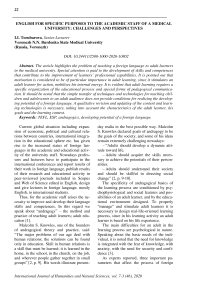Актуальные вопросы развития гериатрии: опыт России и Германии
Автор: Алехина А.В., Силютина М.В., Повалюхина Д.А.
Журнал: Международный журнал гуманитарных и естественных наук @intjournal
Рубрика: Иностранные языки в медицинских специальностях
Статья в выпуске: 7-3 (46), 2020 года.
Бесплатный доступ
В статье рассмотрена актуальность развития гериатрической помощи. В настоящее время в России активно развивается данное направление; в том числе, и Воронежская область участвует в программе развития такого направления, как геронтология и гериатрия. Для врачей первичного звена это направление представляет особый интерес, т.к. в большей степени приходится сталкиваться с пожилыми пациентами. Целью работы является анализ проблем современной гериатрической помощи и разработка возможностей их решения. Комплексная гериатрическая оценка, основанная на опросниках и шкалах, является трудоемкой и продолжительной, но чрезвычайно важной процедурой. Авторы предлагают внедрение цифровых технологий в практику врачей первичного звена (инновационное интерактивное мобильное приложение Всемирной организации здравоохранения WHO ICOPE Handbook App). В целях ознакомления с международной практикой авторы предлагают краткий обзор современного состояния гериатрии в Германии.
Гериатрия, геронтология, цифровые технологии, первичное звено здравоохранения, помощь пожилым пациентам
Короткий адрес: https://sciup.org/170187987
IDR: 170187987 | DOI: 10.24411/2500-1000-2020-10803
Текст научной статьи Актуальные вопросы развития гериатрии: опыт России и Германии
Current global situation including expansion of economic, political and cultural relations between countries, international integration in the educational sphere etc. has given rise to the increased status of foreign languages in the academic and educational activity of the university staff. Nowadays professors and lecturers have to participate in the international conferences and report results of their work in foreign language, publish results of their research and educational activity in peer-reviewed journals included in Scopus and Web of Science edited in English, design and give lectures in foreign language, mostly English, to international students.
Thus, for the academic staff arises the necessity to improve and develop their language skills and competences. In this regard we speak about “andragogy” – the method and practice of teaching adult learners; adult education [1].
Malcolm S. Knowles, one of the founders of andragogical theory and practice, said: “The major problems of our age deal with human relations; the solutions can be found only in education. Skill in human relations is a skill that must be learned; it is learned in the home, in the school, in the church, on the job, and wherever people gather together in small groups” [2, p. 9]. His words illustrate present- day realia in the best possible way. Malcolm S. Knowles declared goals of andragogy to be the goals of the society, and some of his ideas remain extremely challenging nowadays:
– “Adults should develop a dynamic attitude toward life.
– Adults should acquire the skills necessary to achieve the potentials of their personalities.
– Adults should understand their society and should be skillful in directing social change” [2, p. 9-10].
The specificity of andragogical basics of the learning process are conditioned by psychophysiological and social features and possibilities of an adult learner, and by the educational environment designed. To properly “manage” and stimulate adult learners it is necessary to design real-life-oriented learning process, since in his learning activity an adult learner is based on his life experience.
The main difficulties for an adult in the learning process are psychological in nature. Speaking about the basic needs of the individual, it is noted that the need for knowledge is integrated with the fear of knowledge, with anxiety, with the need for security and confidence [3].
As experts reported, three important parameters that affect the process of foreign language learning are age, frequency of contact with the language environment, linguistic remoteness (degree of difference) between the native and the studied language. The presence of all three variables has a dramatically negative effect on the efficiency of the process of teaching a foreign language to adults [4].
The core of the difference between the andragogical approach and traditional teaching principles is that in the learning process the dominant role belongs to the adult learner, who becomes an active participant in educational activities and perceives his teacher rather as a consultant or organizer to help him develop his own learning process.
Results and discussion. It should be noted that the academic staff of Voronezh N.N. Burdenko State Medical University (VSMU) keeps up with the times. The “history” of teaching foreign languages, namely English, to adult learners goes back to 2004, the date when the university (academy at those days) started teaching 1-3-year international students in English language. Nowadays there are about 40-50 adult learners attending foreign language courses in the Department of Foreign Languages, VSMU, on constant basis. We have performed a small survey to design and modify learning process and goals and expectations of learners. Thirty-seven learners, aged 27-72, participated in the survey, 29 of them attend groups classes – four groups including 9, 6, 7 and 7 learners, – and 8 people attend individual classes. The results of the survey given below seem to be rather interesting. Figure 1 demonstrates the initial level of foreign language (FL) knowledge in adult learners. It is necessary to mention that we use specially designed test to detect the level of initial FL knowledge, but in most cases learners refuse to do this test and say that their level of FL knowledge is very low, or “I don’t know/remember anything”.
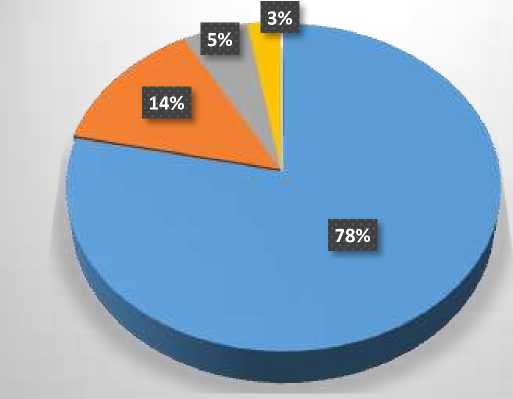
■ elementary
■ pre-intermediate
■ intermediate
■ advanced
Figure 1. Initial level of FL knowledge in adult learners.
In most cases the level of FL knowledge defines whether a person chooses an individual or group work: people who are more confident in their FL knowledge usually chooses individual classes. However, sometimes adult students attend group classes depending on a formal cause: they work at the same department and want to be together like “birds of a feather”; sometimes it results from the knowledge fear and anxiety – the situation we have discussed earlier. Figure 2 shows distribution of adult learners depending on their inclusion in the group/individual work. As shown, a real situation and preferences differ greatly.
Distribution of adult learners depending on their inclusion into group/individual work: real situation and preferences
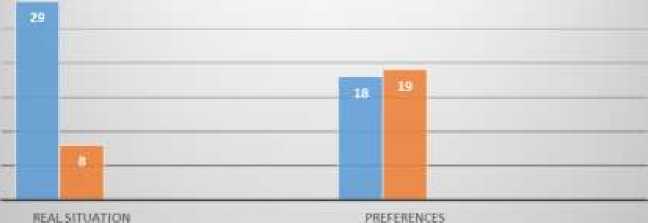
■ in eroiipt ■ indiyKhlfliY
Figure 2. Distribution of adult learners depending on their inclusion in the group/individual work
That is why it is so important to design a FL course for adult learners based on techniques recommended for use in the andragogical approach:
-
– method of positive attitude towards making mistakes;
-
– creative-problematic, game methods;
-
– study of role models, social interaction;
-
– presentation of ideas;
-
– project method.
As reported, a key to success in adult foreign language learning is also the formation of psychological inclusion in the learning process and communicative flexibility by performing a large number of exercises aimed at pair and group work [5].
Conscious attitude towards learning process appears to be a powerful stimulating factor in teaching foreign languages to adult learners, the more so since for most of them FL knowledge is a must for their future successful professional career [6]. As Figure 3 demonstrates, all adult learners are absolutely confident about their educational goals.
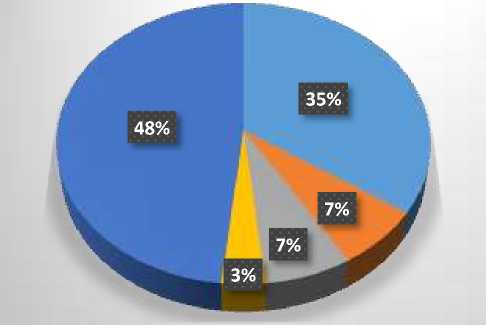
■ for career
■ for travelling
■ for communication for self-development
■ all the above
Figure 3. Educational goals of adult learners
Designing a FL course for adult learners it is essential to consider adequate balance of various forms of speech activity, i.e. listening, reading, speaking and writing, and learners’ perception of these practices. It is common knowledge that for most adults listening seems to the most difficult and “scary” form of speech activity. This fact is supported by results of our survey (see Figure 4). Therefore, it is necessary to take into account that selection of the material should be done carefully and elaborately in accordance with the needs of adults, e.g., listening and speaking should be given the greatest amount of time in the classes, listening activity should be thoroughly prepared, the pedagogical principle of an adequate difficulty should be followed.
It seems advisable for the teacher to use an extensive arsenal of Internet resources, as well as authentic materials from open lectures, specialized programs and educational resources designed for these purposes.
Main difficulties in the foreign language
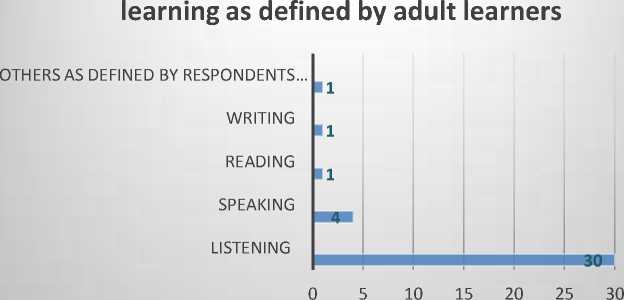
Figure 4. Main difficulties in learning foreign languages
Conclusion. Thus, the development of foreign language communicative competence in adult learners should be directly related to the principles of the andragogical model of teaching foreign languages and should be aimed primarily at the priority of independence in learning.
The learning process must be designed in the way considering the previous experience of adult learners and their real opportunities for the practical application of acquired knowledge in a friendly atmosphere of cooperation and co-creation.
Список литературы Актуальные вопросы развития гериатрии: опыт России и Германии
- Силютина М.В., Саурина О.С., Есауленко И.Э., Таранина О.Н. и др. Состояние геронтологии и гериатрической службы в Воронежской области: от истории развития к перспективам // Успехи геронтологии. - 2018. - Т. 31. - №6. - С. 864-869.
- Хаммад Е.В. Синдром старческой астении как гетерогенное клиническое состояние: дисс. … д-ра мед. наук, БелГНИУ, Белгород, 2019.
- Люцко В.В. Посещаемость врачей общей практики (семейных врачей) в Российской Федерации за период 2007-2017 гг. - 2019. - 23 с.
- Возможности индивидуализации лечебно-реабилитационных программ в гериатрии / Т. Оленская [и др.] // Врач. - 2017. - №6. - С. 7-51.
- Алехина А.В., Силютина М.В. Функциональные нарушения у пожилых людей и способы их выявления (72-74) // Евразийский Союз Ученых. Медицинские науки. 2020/06/14; 74(6):72-74. DOI: 10.31618/ESU.2413-9335.2020.6.74.763
- WHO, Technical Report on Ageing, 2015.
- Приказ Министерства труда и социальной защиты Российской Федерации от 17.06.2019 № 413н "Об утверждении профессионального стандарта "Врач-гериатр". - [Электронный ресурс]. - Режим доступа: https://rg.ru/2019/07/15/mintrud-prikaz413-site-dok.html (дата обращения: 02.04.2019)
- Ткачева О.Н., Котовская Ю.В., Рунихина Н.К., Фролова Е.В., Наумов А.В., Воробьева Н.М., Остапенко В.С., Мхитарян Э.А., Шарашкина Н.В., Тюхменев Е.А., Переверзев А.П., Дудинская Е.Н. Клинические рекомендации "Старческая астения" // Российский журнал гериатрической медицины. - 2020. - №1. - С. 11-46. DOI: 10.37586/2686-8636-1-2020-11-46
- Методические рекомендации по профилактическому консультированию пациентов 75 лет и старше с целью профилактики развития и прогрессирования старческой астении // Ткачева О.Н., Рунихина Н.К., Котовская Ю.В., Воробьева Н.М. и др., 2017.
- Zeitschrift fur Gerontologie und Geriatrie; №7; 2019.

